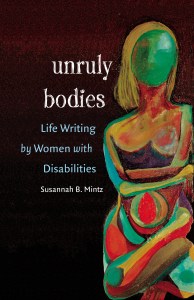Happy Disability Pride Month! A Recommended Reading List
If you didn’t know already, July is Disability Pride month. The celebration of Disability Pride began in 1990 and has held on strong ever since. “This annual observance is used to promote visibility and mainstream awareness of the positive pride felt by people with disabilities.” Below are a few titles that align with that point of view; shedding light on a wide range of experiences from those who identify as disabled.
HARRIET, THE MOSES OF HER PEOPLE
BY SARAH HOPKINS BRADFORD

In 1869, Sarah Hopkins Bradford published Scenes in the Life of Harriet Tubman. Though often disjointed, this account presented to the public a legendary figure of the Underground Railroad. In 1886, Bradford substantially rewrote the biography at the request of Tubman, who hoped its sales would raise enough funds for the building of a hospital for old and disabled colored people. This second edition, Harriet, the Moses of Her People, provided little new information, but arranged the jumbled narrative of Scenes in chronological order, providing a clearer account of Tubman’s life.
NO RIGHT TO BE IDLE: THE INVENTION OF DISABILITY, 1840s – 1930s
BY SARAH F. ROSE

During the late nineteenth and early twentieth centuries, Americans with all sorts of disabilities came to be labeled as “unproductive citizens.” Before that, disabled people had contributed as they were able in homes, on farms, and in the wage labor market, reflecting the fact that Americans had long viewed productivity as a spectrum that varied by age, gender, and ability. But as Sarah F. Rose explains in No Right to Be Idle, a perfect storm of public policies, shifting family structures, and economic changes effectively barred workers with disabilities from mainstream workplaces and simultaneously cast disabled people as morally questionable dependents in need of permanent rehabilitation to achieve “self-care” and “self-support.”
UNRULY BODIES: LIFE WRITING BY WOMEN WITH DISABILITIES
BY SARAH F. ROSE
The first critical study of personal narrative by women with disabilities, Unruly Bodies examines how contemporary writers use life writing to challenge cultural stereotypes about disability, gender, embodiment, and identity.
Combining the analyses of disability and feminist theories, Susannah Mintz discusses the work of eight American autobiographers: Nancy Mairs, Lucy Grealy, Georgina Kleege, Connie Panzarino, Eli Clare, Anne Finger, Denise Sherer Jacobson, and May Sarton. Mintz shows that by refusing inspirational rhetoric or triumph-over-adversity narrative patterns, these authors insist on their disabilities as a core–but not diminishing–aspect of identity. They offer candid portrayals of shame and painful medical procedures, struggles for the right to work or to parent, the inventive joys of disabled sex, the support and the hostility of family, and the losses and rewards of aging. Mintz demonstrates how these unconventional stories challenge feminist idealizations of independence and self-control and expand the parameters of what counts as a life worthy of both narration and political activism. Unruly Bodies also suggests that atypical life stories can redefine the relation between embodiment and identity generally.
UNSPEAKABLE: THE STORY OF JUNIUS WILSON
BY SUSAN BURCH
Junius Wilson (1908-2001) spent seventy-six years at a state mental hospital in Goldsboro, North Carolina, including six in the criminal ward. He had never been declared insane by a medical professional or found guilty of any criminal charge. But he was deaf and black in the Jim Crow South. Unspeakable is the story of his life.
Using legal records, institutional files, and extensive oral history interviews–some conducted in sign language–Susan Burch and Hannah Joyner piece together the story of a deaf man accused in 1925 of attempted rape, found insane at a lunacy hearing, committed to the criminal ward of the State Hospital for the Colored Insane, castrated, forced to labor for the institution, and held at the hospital for more than seven decades. Junius Wilson’s life was shaped by some of the major developments of twentieth-century America: Jim Crow segregation, the civil rights movement, deinstitutionalization, the rise of professional social work, and the emergence of the deaf and disability rights movements. In addition to offering a bottom-up history of life in a segregated mental institution, Burch and Joyner’s work also enriches the traditional interpretation of Jim Crow by highlighting the complicated intersections of race and disability as well as of community and language.



You must be logged in to post a comment.